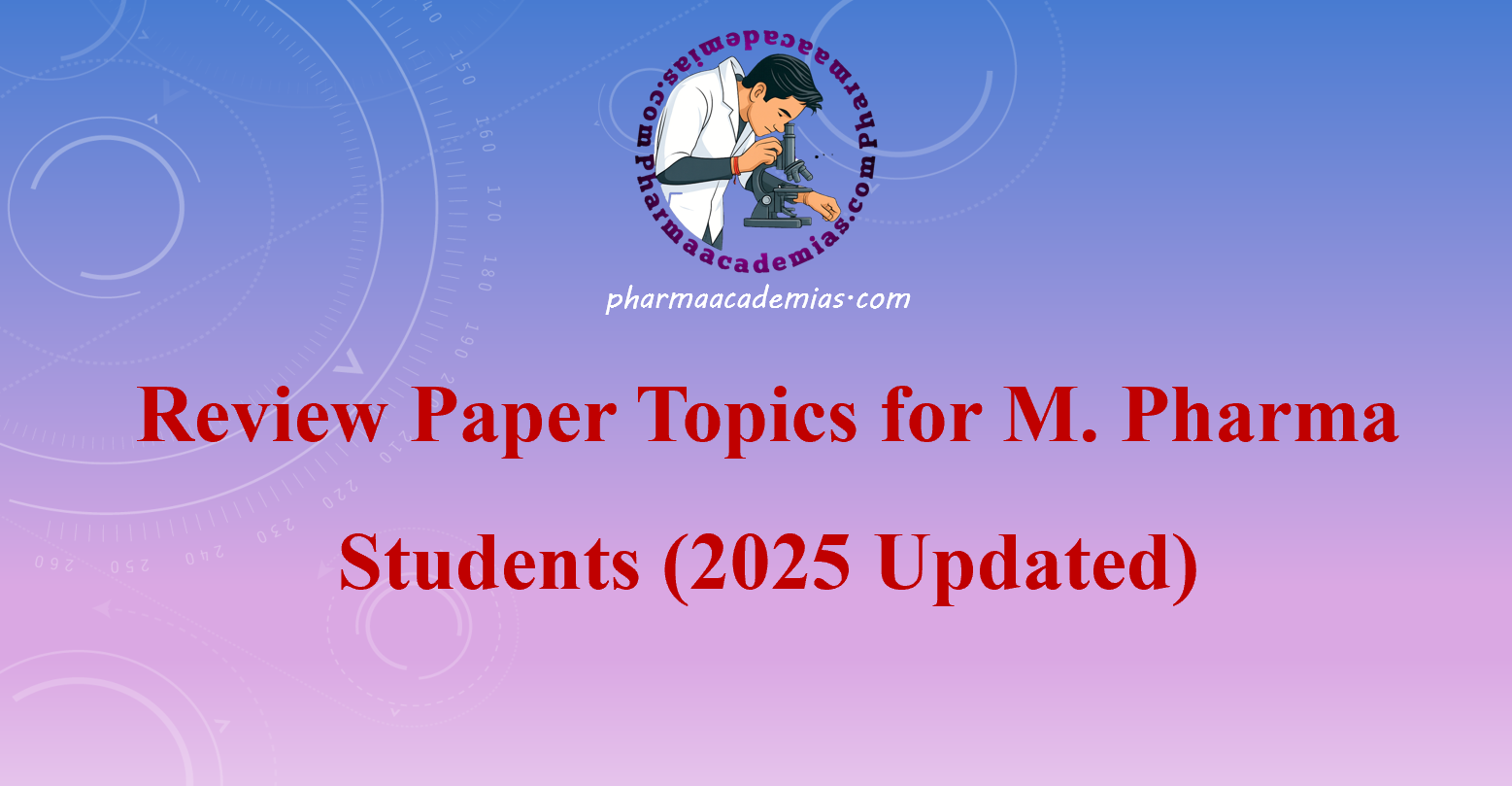Introduction
The M. Pharma curriculum not only demands academic excellence but also encourages analytical thinking, innovation, and scientific writing. One of the core academic responsibilities of a postgraduate student is to write a comprehensive review paper. Choosing a topic that is both current and relevant to your specialization—whether it’s pharmaceutics, pharmacology, or pharmacognosy—can help in building a solid academic foundation and may even contribute to the scientific community if published.

This guide aims to provide a detailed overview of the review paper topics in pharmaceutics, pharmacology, and pharmacognosy, focusing on recent trends, how to choose a suitable topic, tips for referencing, and a free downloadable PDF of topic suggestions.
Tip: “Need More Help?” or “Personal Guidance Available” at the end of the PDF.
Importance of Review Papers
Writing a review paper offers several academic and professional benefits for M. Pharma students:
- Critical Thinking: Review papers require deep analysis and comparison of existing research, fostering critical thinking.
- Literature Mastery: They help students gain mastery over the subject by understanding what has already been done and what gaps exist.
- Publication Opportunities: A well-written review may get published in peer-reviewed journals, adding value to your academic CV.
- Skill Development: It sharpens skills in academic writing, research methodologies, citation ethics, and data analysis.
- Career Boost: Whether you aim for a career in research, industry, or academia, a good review paper can set you apart from other candidates.
Review Paper Topics in Pharmaceutics, Pharmacology, and Pharmacognosy
Below is a categorized list of 30+ trending review paper topics for M. Pharma students in 2025, divided into their respective domains.

- 3D Printing in Pharmaceutical Drug Delivery Systems
- Advancements in Lipid-Based Drug Delivery Systems
- Nanoemulsion Technologies for Topical Applications
- Smart Polymers in Controlled Drug Release
- Oral Thin Films: Future of Oral Drug Delivery
- Microneedles in Transdermal Drug Delivery
- Hydrogels for Wound Healing Applications
- Floating Drug Delivery Systems: A Revolutionary Gastric Approach
- Bioavailability Enhancement Techniques for Poorly Soluble Drugs
- Self-Emulsifying Drug Delivery Systems (SEDDS): Recent Advances

- CRISPR and Its Therapeutic Implications in Genetic Disorders
- Targeted Cancer Therapy Using Mcl-1 Inhibitors
- Cannabinoid Receptors in Seizure Control: Mechanistic Pathways
- Pharmacovigilance and Signal Detection in Post-Marketing Surveillance
- Role of Inflammation in Skin Cancer Development
- Antioxidants in Neurodegenerative Disorders: Promise or Hype?
- AI in Clinical Trials: Accelerating Drug Discovery
- Hormesis in Pharmacology: Low-Dose Therapeutics
- Role of Immune Cells in Tumor Microenvironment
- Pharmacokinetics in Special Populations: Pediatric and Geriatric Focus

- Medicinal Plants Used in Acne Treatment
- Anti-Psoriatic Plants and Their Pharmacological Basis
- Phytochemicals as Natural Anticancer Agents
- Emmenagogues: A Herbal Perspective
- Role of Adaptogens in Stress Management
- Ayurvedic Formulations for Chronic Disorders
- Toxicomicrobiomics: Microbiome’s Role in Drug Toxicity
- Pulmoria Rubra in Traditional and Modern Medicine
- Bioactive Compounds from Marine Sources
- Natural Immunomodulators in Viral Infections
How to Choose the Right Review Paper Topic
Selecting a review topic can be overwhelming, but these steps will simplify the process:
1. Match With Your Specialization: Your topic should align with your branch (Pharmaceutics, Pharmacology, Pharmacognosy, etc.). For instance, if you’re pursuing Pharmaceutics, look for topics like drug delivery systems, bioavailability, or nanotechnology.
2. Identify Your Interest: Go for a topic that genuinely excites you. If you’re curious about how AI is transforming drug discovery, delve into it. Passion will keep you motivated throughout the writing process.
3. Check for Data Availability: Ensure that enough published literature exists on the topic. A good review paper needs at least 20–30 references from reputable sources like PubMed, ScienceDirect, Springer, etc.
4. Consult Your Guide: Always take feedback from your project supervisor or mentor. They can help you align your topic with current research trends or departmental focus.
5. Scope for Innovation: Choose a topic that allows for the identification of gaps in existing research. This will make your review insightful and valuable for future researchers.
Referencing Tips for Review Papers
Academic honesty and proper citation are essential in review writing. Here are some important tips:
1. Use Trusted Sources Only: Always use peer-reviewed journals, PubMed, Google Scholar, Scopus, and official websites. Avoid blogs, Wikipedia, or unverified sources.
2. Follow a Citation Style: Use a standard referencing style like:
- APA (American Psychological Association)
- Vancouver (common in medical writing)
- Harvard or MLA (based on your university requirement)
Example in Vancouver Style:
3. Use Referencing Tools: Tools like Zotero, Mendeley, and EndNote make citation easier. Google Docs and MS Word also have built-in citation features.
4. Organize Your References: Maintain a spreadsheet or document with all the articles you’ve read, including title, author, publication year, journal name, and DOI.
5. Avoid Plagiarism: Use tools like Turnitin, Quetext, or Grammarly Premium to ensure originality and maintain academic integrity.
Free PDF: 50+ Review Paper Topics for M. Pharma Students
To make things even easier for you, we’ve created a downloadable PDF with 50+ review paper topics across all major areas of pharmaceutical sciences.
Includes:
- Topic name
- Suitable specialization
- Suggested references
- Brief description of the scope
Final Words
Writing a review paper is a rewarding and insightful academic exercise that prepares M. Pharma students for future research, publication, and industry roles. With the pharmaceutical sciences evolving rapidly—thanks to AI, nanotech, biotech, and personalized medicine—there is no dearth of impactful and innovative topics.
So whether you’re passionate about drug delivery, natural products, pharmacovigilance, or biotech advancements, you’ll find a topic that resonates with your interests and enhances your academic journey.

This article has been optimized for the focus keyword review paper topics in pharmaceutics—making it easier for M. Pharma students to discover useful and trending ideas.



